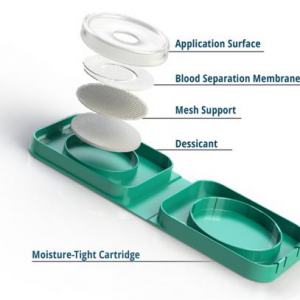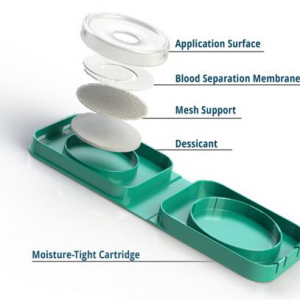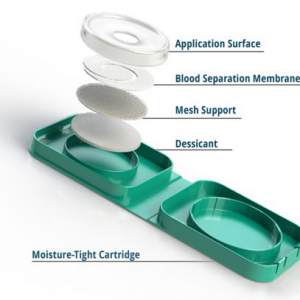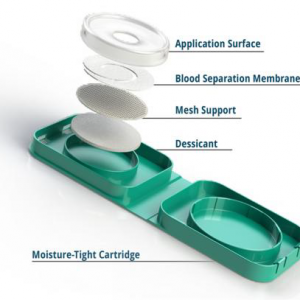Description
![]()
Unit: 1 Each
Contents: 1 Collection Kit (Instructions, Blood Collection Card, Lab Form, Blood Sample Return Bag, Prepaid Return Envelope, Wound Kit, Lab Processing, Results Reporting)
Determinations: Lipid Profile & Prostate-Specific Antigen (PSA)
Storage Requirements: 59° – 86° F
The Lipid Profile / PSA Combo Collection Kit is an effective method of determining a patient’s risk for heart disease as well as for diabetes. Only a single finger stick is required to obtain a sample. In one week, a comprehensive report containing quantitative results will be issued, permitting physicians to make a prompt diagnosis and begin treatment.
The Lipid Profile test measures the amount of total cholesterol, triglycerides, HDL (high-density lipoprotein, “good cholesterol”), and calculated LDL (low-density lipoprotein, “bad cholesterol”) in blood. Each one is a distinctive type of fat that circulates in our blood. A certain amount of these fats are necessary for our bodies to function, particularly in maintaining cell membrane stability. However, having too much cholesterol in our blood can also be detrimental. It can cause deposits and build up in blood vessel walls, clogged arteries (known as atherosclerosis), and eventually blood clots leading to a heart attack or stroke. Knowing your cholesterol levels can help determine your risk of heart disease.
Unalterable Risk Factors for Coronary Disease:
- Age
- Gender – Males
- Menopausal decrease in Estrogen
- Family History
Alterable Risk Factors for Coronary Disease:
- High Blood Pressure
- High Cholesterol Levels
- Tobacco Smoking
- Excessive Alcohol Consumption
- Obesity
- Stress
- Air Pollution
- Lack of Exercise
Although coronary disease is the leading cause of death in the US, only 20% of those cases can be attributed to genetic risk factors. By focusing on diet, maintaining a healthy lifestyle, and regularly testing cholesterol levels, patients can be proactive in reducing their chances for heart disease.
Prostate Specific Antigen (PSA) is a protein produced by the prostate gland that is measurable in the blood through laboratory analysis. The prostate gland, an exocrine gland and a fundamental part of the male reproductive system, lies just below the bladder, in front of the rectum. It is approximately the size of a walnut and secretes prostatic fluid (constituting of 50-75% of the liquid volume of semen) which aids in transporting and prolonging the lifespan of the sperm. An excessive amount of PSA produced by the prostate could be an indication of a serious health problem and should be further evaluated by a physician.
As men age, they are progressively at higher risk for prostate disease such as Benign Prostatic Hyperplasia (BPH) or prostate cancer. This PSA Test will measure the level of prostate specific antigen in the blood and is one of the best methods available for monitoring overall prostate health. The American Urological Association recommends that all men over the age of 40 receive an annual prostate evaluation consisting of a PSA test as well as a digital rectal exam. However, African American men and those with a family history of prostate cancer should begin testing even earlier.
The PSA Prostate Cancer Screening Test provides the same results that can be obtained from your local medical laboratory without the high cost and inconvenience of doctor’s appointments, laboratory fees, and an often painful and unnecessary direct venous or arterial blood draw. This test can be conveniently performed at home in less than ten minutes, and quantitative results can be obtained in approximately the same time as those routinely ordered through a physician.
Complete instructions are included, and sample collection is quite easy and virtually painless. A single finger stick using the enclosed lancet is all that is required to obtain the sample needed. Simply deposit the drops of blood on the collection card and wait a minimum of 10 minutes for it to dry. Then place the card in the enclosed postage paid return envelope along with your completed Laboratory Authorization Form, and drop in the nearest US mailbox.
After your sample has been analyzed at the Laboratory, you will receive a report by mail that clearly indicates if the results are normal or if a follow up with a health care provider is needed. Early detection of abnormal TSH levels greatly increases your chances for successful treatment.
Expect to receive your quantitative test results within one week from the time your test has been received by the Laboratory.
Lipid Profile & PSA Collection Kit (Mail-In) Includes:
Instructions
Blood Collection Card
Lab Form
Blood Sample Return Bag
Prepaid Return Envelope
Wound Kit
Lab Processing
Results Reporting
Wound Kit contains: (2) Lancets, Alcohol Prep Pad, Gauze and Band-aid




